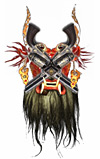

|
Some Links
Archives Return to the Original Gunman Return to Dylon Whyte's Current Thoughts Blog Buddies Draxenn's Mindless Madness The Displaced Bostonian Inside the Mind of Jake Ortman One Click from Sanity Kusari Online Question Reality Paradoxian Tarot How Many Would it Take? Hot or Not? Face the Jury 
Email Me
IM Anyone? ICQ: 2128006 MSN: kusari_kahn @hotmaildotcom AIM: KusariKahn Y!: kusari55 |
Disclaimer: Please note that the writer is not responsible for dead, boring, mind expanding or dangerous website links and/or software, follow links and install programs at your own risk! Friday, September 03, 2004
"Turing the Countryside, O Frabjous Day!"While it seems simple to press the keys on our keyboards and see words appear on our monitors and then e-mail them halfway around the world, the base science of such matters are what an old guru I once knew described as an "FM Unit". "My Boy", he would begin, "Folks today just don't understand how computers work, they all expect to open the cover and find an FM Unit controlling everything". I would inquire just what an FM Unit was. "Friggin Magic", he would respond, "they all think technology runs on crystal balls and pixie dust." To the same end, Arthur C. Clarke, author of "2001: A Space Odyssey", stated: "Any sufficiently advanced technology is indistinguishable from magic". But has modern technology really advanced to the point where it is indistinguishable from magic? There are thousands of computer scientists in the world who would chortle a resounding "NAY!" Alan Turing ( http://www.turing.org.uk/turing/index.html ), founder of modern computer science would most likely be responsible for the loudest chortles, but at the same time awe-struck at the evolution of his conceptual "Turing Machines" to today's personal computers to tomorrow's thinking machines. Always a visionary ahead of his time, in 1950, and without benefit of today's motion pictures such as "The Matrix", "Terminator" and "2001"", Alan Turing asked, "Can a Machine Think?". To his logic, the only answer was yes, but this belayed an even larger question to his philosophical mind, "If a computer could think, how could we tell?" Turing went on to develop "The Turing Test", a practical methodology for testing a computer's ability to think by attempting to deceive an interrogator into believing they are chatting with a real person. Each year the Loebner Prize ( http://www.loebner.net/Prizef/loebner-prize.html ) is awarded to the computer program which is best able to fool its interrogators. The winner of the 2003 prize was a program called "Jabberwock" ( http://www.abenteuermedien.de/jabberwock/ ). Today, "Completely Automated Public Turing test to tell Computers and Humans Apart" or CAPTCHAs ( http://www.parc.xerox.com/research/istl/projects/captcha/ ) have recently become commonplace on the Internet, taking the form of code boxes that are currently only decipherable by human minds. Magic or Science? That's for you to decide, just be aware that "I'm sorry Dave, I'm afraid I can't do that" may take on a whole new meaning when the Turing Police show up with a warrant to arrest your home computer! posted by Kusari 9:38 PM |